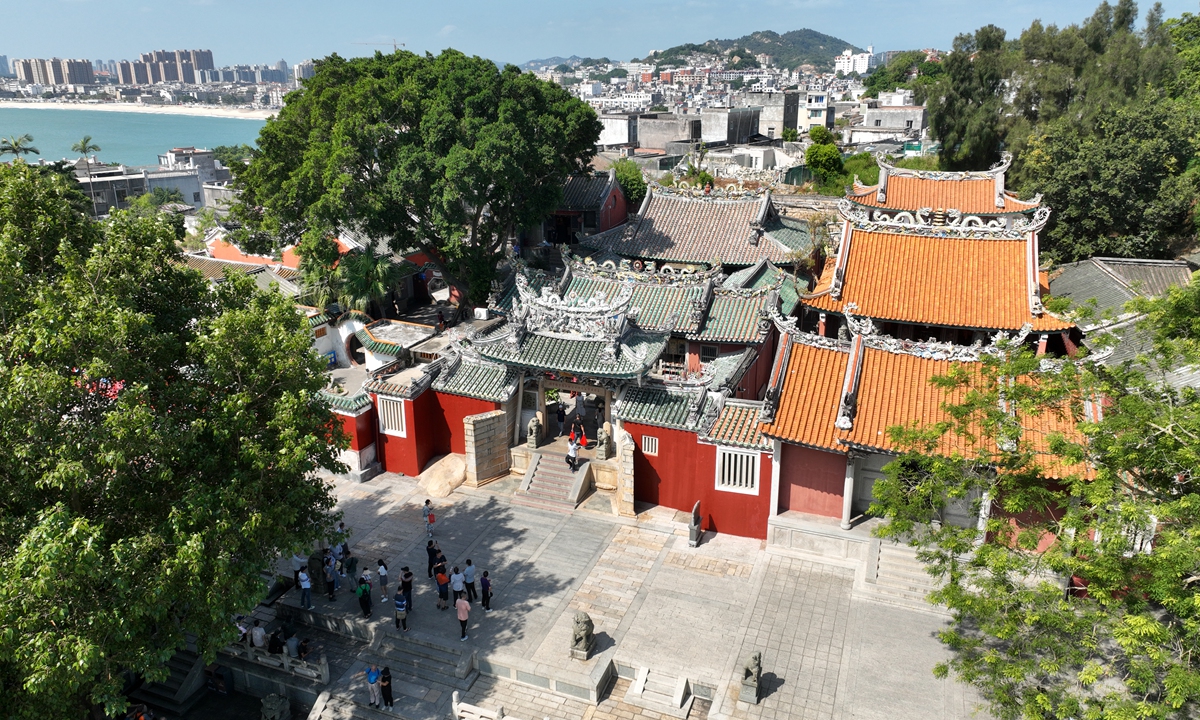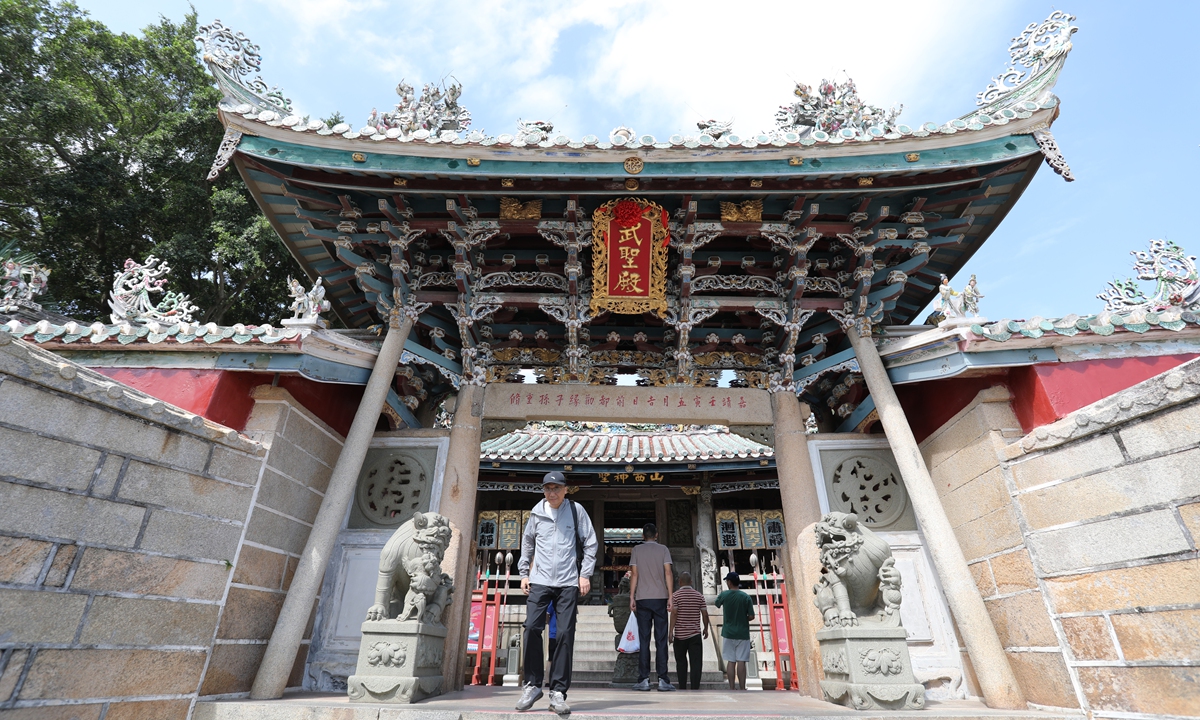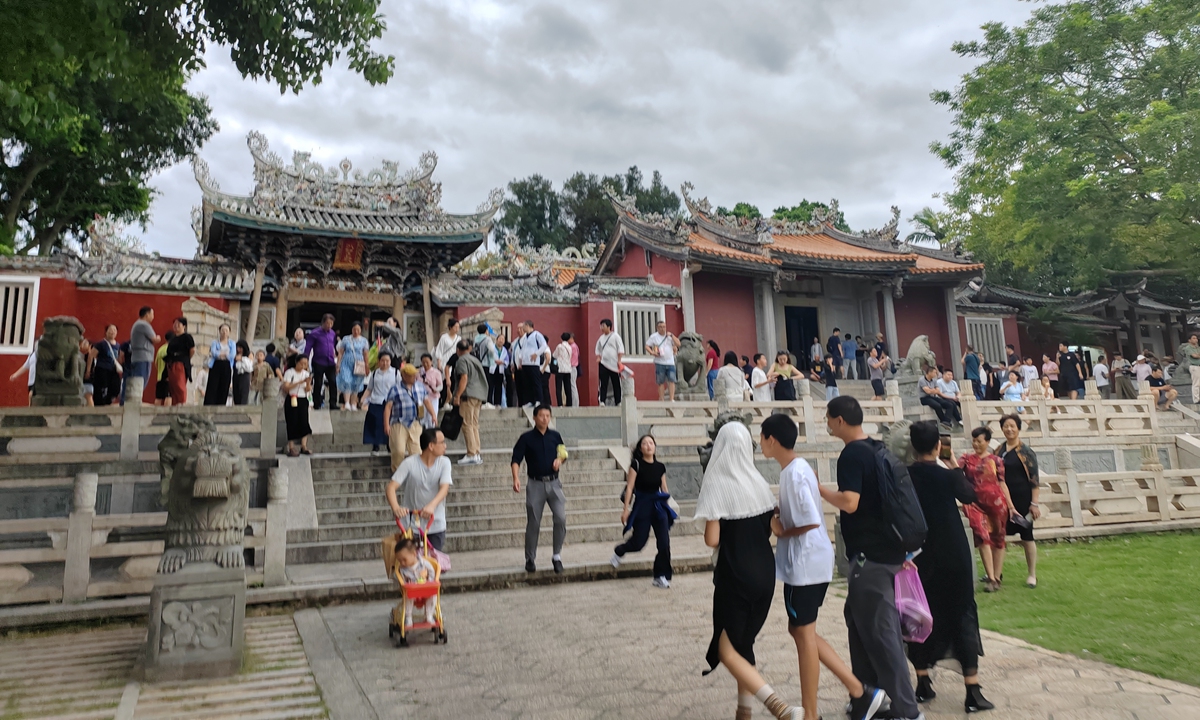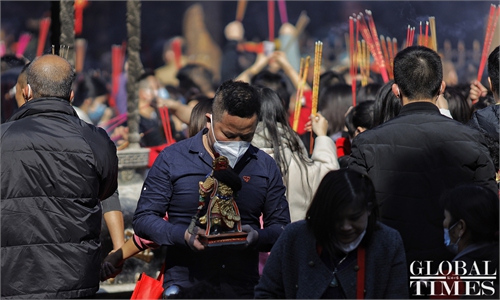ARTS / CULTURE & LEISURE
Guandi culture serves as spiritual link between two sides of Taiwan Straits and among overseas Chinese communities

A bird's eye view of the Dongshan Guandi Temple in Dongshan county, East China's Fujian Province, on October 18, 2024. Photo: Courtesy of Dongshan county media center
Putting their palms together devoutly, representatives and believers from 10 temples in the island of Taiwan recently visited the Tonghuai Temple of Guan Yu and Yue Fei, to pay homage to their ancestors and trace their origins in Quanzhou, East China's Fujian Province, Chinanews.com reported.This year, nearly 6,000 people from the island of Taiwan, temples and civil society groups have visited Tonghuai Temple, which is one of the most well-known destinations for folk religious activities in southern Fujian.
The temple is the ancestral temple of more than 600 Guandi temples in Southeast Asia, as well as in the Hong Kong Special Administrative Region (SAR), the Macao SAR and the island of Taiwan.
Guandi culture refers to the cultural and religious practices associated with the worship of Guan Yu (also known as Guandi), a historical figure from the Three Kingdoms (220-280) period in China. Guan is revered as a symbol of loyalty, righteousness, and martial prowess.
Guan Yu is seen as a protector of merchants and is commonly associated with prosperity and success in business. Guandi culture is an important aspect of Chinese heritage and reflects the values and beliefs that have evolved over centuries.
Take the Guandi cultural industrial park in Dongshan, Fujian as an example. Dongshan authorities have stepped up efforts in strengthening the protection of cultural heritage while promoting cultural exchanges across the Taiwan Straits.
Hong Yongde, director of Dongshan County Fengdongshi Scenic Area Service Center, told the Global Times that since 1992, Dongshan has held the Cross-Straits Guandi Culture and Tourism Festival in the Guandi cultural industrial park annually, attracting many believers from Taiwan to take part.

An exterior view of the Dongshan Guandi Temple in Dongshan county, East China's Fujian Province, on October 18, 2024. Photo: Courtesy of Dongshan county media center
Historical origins"For a long time, the Guandi Temple in Dongshan has been carrying forward Guandi culture, taking advantage of its geographical location, divine connections, and kinship, making it a spiritual link between the two sides of the Straits, as well as among overseas Chinese communities. The Dongshan Guandi Temple has greatly influenced the cultural heritage in Fujian, Guangdong, Taiwan, Hong Kong, Macao, and among overseas Chinese communities," Hong noted.
In November 2020, the Dongshan Guandi Temple was recognized by the All-China Federation of Returned Overseas Chinese as the eighth location in the batch of international cultural exchange bases for overseas Chinese. "It is a new starting point and a new journey," said Hong.
Built in 1387 during the Ming Dynasty (1368-1644), the Guandi Temple in Dongshan aimed to prevent Japanese invasion.
"For hundreds of years, due to factors such as land reclamation, military affairs, squadrons, and trade, Dongshan has had close exchanges with Taiwan. Nowadays, there are nearly 1,000 Guandi temples in Taiwan and they all recognize the Dongshan Guandi Temple as the Xiangyuan Ancestral Temple," Hong explained.
Spiritual bond
Liu Xiaolong, a former vice chairman of the Dongshan County Committee of the Chinese People's Political Consultative Conference, told the Global Times that as a long-established cultural belief, Guandi culture has a deep foundation and extensive influence among the people on both sides of the Taiwan Straits.
"Guandi culture profoundly demonstrates the close cultural connection between the two sides of the Taiwan Straits," said Liu, who has been in charge of cross-Straits Guandi cultural exchange promotion.
On May13 in the lunar calendar, which marks Guan Yu's birthday, Dongshan county hosts the Cross-Strait Guandi Culture and Tourism Festival, which welcomes compatriots from the Hong Kong SAR, the Macao SAR, and the island of Taiwan, as well as overseas Chinese communities.
"Through these activities, we can effectively promote exchanges and cooperation in the cultural and economic fields," Liu pointed out.

Visitors explore near the entrance of the Dongshan Guandi Temple in Dongshan county, East China's Fujian Province, on October 2, 2024. Photo by Zhang Congyuan
Inheritance and promotionBoth sides of the Taiwan Strait share many similarities in terms of Gaudi beliefs and customs. The sacrifices and ritual procedures in sacrificial ceremonies are very similar, Liu explained.
In a Cross-Straits Guandi cultural and creative products competition held in Dongshan county this year, Lin Shengzhang, a Taiwan resident, won the gold medal. Lin told the Global Times that he believes Guandi culture is an important link connecting the two sides of the Taiwan Strait.
The General Manager of the Taiwan Dayou Food Group Weng Yuci, who is a supporter of Guandi culture, told the Global Times that she has participated in many activities linked to the celebration of Guandi culture.
With Guandi culture in place as a solid foundation, believers and all overseas Chinese communities find it easier to connect and communicate, she said.
"We don't have to start as strangers, as we consider those who are in business and share Guandi culture to be accountable and worth cooperating with," Weng said.
Zhu Zhengming, a culture scholar, told the Global Times that Guandi culture is now a spiritual link connecting the two sides of the Taiwan Straits.
A visiting professor at Hubei University and Yangtze University, Zhu spent at least four decades traveling across five continents in more than 60 countries and regions, tracing Guandi culture. Zhu said that he has witnessed Taiwan residents' passion and sincerity through Guandi culture.
As early as 1990s, Zhu defined five main locations to commemorate Guan Yu: Yuncheng, North China's Shanxi Province; Luoyang, Central China's Henan Province; Dangyang, Central China's Hubei Province; Jingzhou, Central China's Hubei Province; and Dongshan, East China's Fujian Province.

